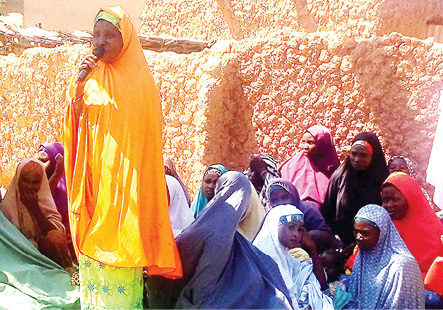How external intervention is giving hope to women farmers
Ever since women’s involvement in agricultural practices, many have not seen the development as a means of earning a living, but that of feeding oneself. However, the role played by women in meeting challenges of agricultural development in the north cannot be overlooked. It is on record that many women involved in agricultural practices have […]

Leader of Kafin Gana women rice processors Malama Ladidi Hauna addressing the team during Sasakawa media tour. Pic Ibrahim Musa Giginyu
Ever since women’s involvement in agricultural practices, many have not seen the development as a means of earning a living, but that of feeding oneself. However, the role played by women in meeting challenges of agricultural development in the north cannot be overlooked. It is on record that many women involved in agricultural practices have made significant contributions to food production and processing.
The irony is that men seem to take more of the farm decisions and control the productive resources, while also all the intervention from relevant authorities usually entirely went to the men farmers. It is apparent that beneficiaries of most agricultural interventions in most states are the men because of the traditional belief that farming is a man’s business.
However, to effectively encourage women farming and with consideration to the unrecognised efforts they have being rendering to the agricultural sector, recent attempts by government at all levels and development partners in the agricultural sector are ensuring that small holder women farmers benefit from all forms of agricultural interventions. This turn of events has started gaining ground as women farmers are being encouraged to form groups for easy access to interventions.
In this regard, the Sasakawa Global 2000 (SG2000) agricultural initiative which promotes women participation along the value chain in agriculture has also ensured that many women have now become actively involved in agriculture with the solid backing of associations such that a reliable stream of income is accruing to them.
Speaking during a field tour with the media on Sasakawa projects in some of its intervention sites in Kano, Jigawa and Gombe states, Sasakawa Global 2000 Country Director, Professor Sani Miko, stated that SG2000-Nigeria country programme began in March 1992, under an agreement signed with the Federal Ministry of Agriculture and Natural Resources to work with federal and state agencies to raise agricultural productivity and improve food crop marketing among Nigerian farmers.
He added that the project had over the years recorded a lot of successes in creating market for products produced by small scale farmers as well as improving their knowledge on new agricultural techniques through which many women farmer associations were formed and some have excelled.
“We are promoting women engagement in agriculture in some of the northern states in Nigeria, and the good news is that most of these women have formed groups and are presently fully engaged in full time agricultural practices,” said Professor Miko.
According to Malama Laraba Hassan, leader of Aci Lafiya women rice milling group in Kazaure Local Government Area of Jigawa State, SG2000 made them form associations and trained them on modern rice farming techniques, adding that they now produce more than some of the men.
She added that they were also given a small rice milling machine on credit to be repaid over some years.
“As a group, we were trained on how to manage and maintain the rice milling machine given to us by Sasakawa. To God be the glory, we had intended packaging the product with our group’s logo but due to constant demand we were not able to do that.
“Apart from growing rice, we now buy from others and mill it at N500 per bag of rice paddy. As I speak with you now, we supply as far as some parts of Niger Republic, in addition to Kano and Jigawa states.
“The good news here is that we no longer wait for our husbands for our daily needs. What I mean is that we are now economically viable and independent financially,” narrated Malama Laraba.
It was also gathered that the group’s name has been enrolled under the suppliers of rice to the school feeding scheme of the Federal Government.
At Kafin Gana village in Birnin Kudu Local Government, SG2000 has engaged a service provider to effectively run the rice milling machine given to Kafin Gana women rice processors.
According to the leader of the women rice processors, they experienced some difficulties in the maintenance of the machine due to its spare parts unavailability. She added however that they already have one which they were used but that they would continue to patronise the one under the service provider’s control.
Under the scheme introduced by SG2000, many women farmer groups in Kano, Jigawa and Gombe states presently have their processed rice and maize flour sold across various Nigerian markets, thereby making them self-reliant and economically viable.
